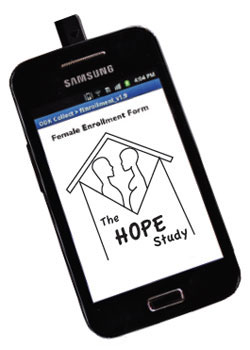Think innovation and high-tech must go together? Think again. Partnerships between UW's Department of Global Health and the Department of Computer Science & Engineering (CSE) have created simple, low-tech solutions to public health challenges in Africa, especially for women and children.

Simple cellphone technology has transformed research in Kenya
Among them:
• An SMS (short message service) program using no-frills cellphones to encourage pregnant women to attend prenatal care, deliver with a skilled attendant and receive family planning advice;
• A low-cost way to pasteurize small quantities of breast milk from HIV-positive mothers so their infants do not have to go on formula and will receive their mothers' immune system advantages;
• Use of cellphones to collect HIV data from pregnant women easily and provide
the data to researchers rapidly.
Says Carey Farquhar, professor of Epidemiology and Global Health, "We wanted to find practical applications for technology in a global health setting." Farquhar directs the UW International AIDS Research and Training Program. Her study, called HOPE (for home-based, partner, education), which collects data from pregnant women at Kisumu District Hospital, is being done with the Kenya Ministry of Health.
Data are collected on smartphones, using forms she developed. The health worker in Kenya then submits the data, which are uploaded to a server in the Ministry of Health. The smartphone also uses its GPS feature to locate the homes of the women for subsequent counseling of the woman and her partner.
One of the huge advantages is that data summaries come back so fast. Says Farquhar, "Formerly we had data on paper and then had to enter it manually and triple check it. It would take weeks to do and get back. Now we get weekly summaries of the data results. We can take a quality improvement approach and tweak the study if necessary."
Jennifer Unger seconds the ability to access data rapidly as a big benefit of SMS technology. She is acting assistant professor of Obstetrics and Gynecology at UW Medical School and Harborview Medical Center. Her research is being conducted in a large slum of Nairobi, under Global WACh, a center within the Department of Global Health focusing on the well-being of women, children and adolescents.
Her randomized clinical study aims to reduce maternal and newborn disease by using SMS to remind Kenyan women in poor or rural areas of appointments, give advice, and encourage them to deliver in a hospital or clinic. A control group receives no SMS messages. One group receives a one-way message. Another group receives a two-way message with a query to be answered. So far, 70 percent of the women receiving a two-way SMS message are not only answering the question asked, but also posing questions to the study nurse. (Ninety percent of women in this part of Kenya have easy access to cellphones, says Unger.)
In these studies, CSE post-doctoral scholar Brian DeRenzi played a crucial role. He heard a presentation by Unger and eventually collaborated with her to create the system being used. He also brought in a CSE grad student, Trevor Perrier, who developed the prototype of the SMS system and is now Unger's main collaborator. For the HOPE project, DeRenzi introduced Farquhar to undergraduate Saloni Parikh, who programmed the phones. Parikh is a senior with a dual major in Public Health and CSE.
The milk pasteurization project was done with PATH and uses a hot plate, a couple of jars and temperature probes widely available. The AIDS virus is killed relatively rapidly at 72°C after 10–15 seconds, leaving the good antibodies to pass on to the infant.
CSE Professor Gaetano Borriello directs efforts that apply mobile technologies to problems in low-resource areas and advises a group of students who come from a variety of UW schools, including public affairs, public health, business, communications, information, computer science. What they have in common is a desire to apply technology to solve the problems of the poorest people globally. The group, called "Change," generally works through NGOs, such as PATH and VillageReach.
Says DeRenzi, who currently works at the IBM research lab in Nairobi, "Now is a very exciting time for technology and global health delivery. The spread of mobile devices throughout low-income settings provides the perfect computing platform for interventions. Seattle is a perfect place to do this kind of work because of its experience with global health and the strong technology sector."
